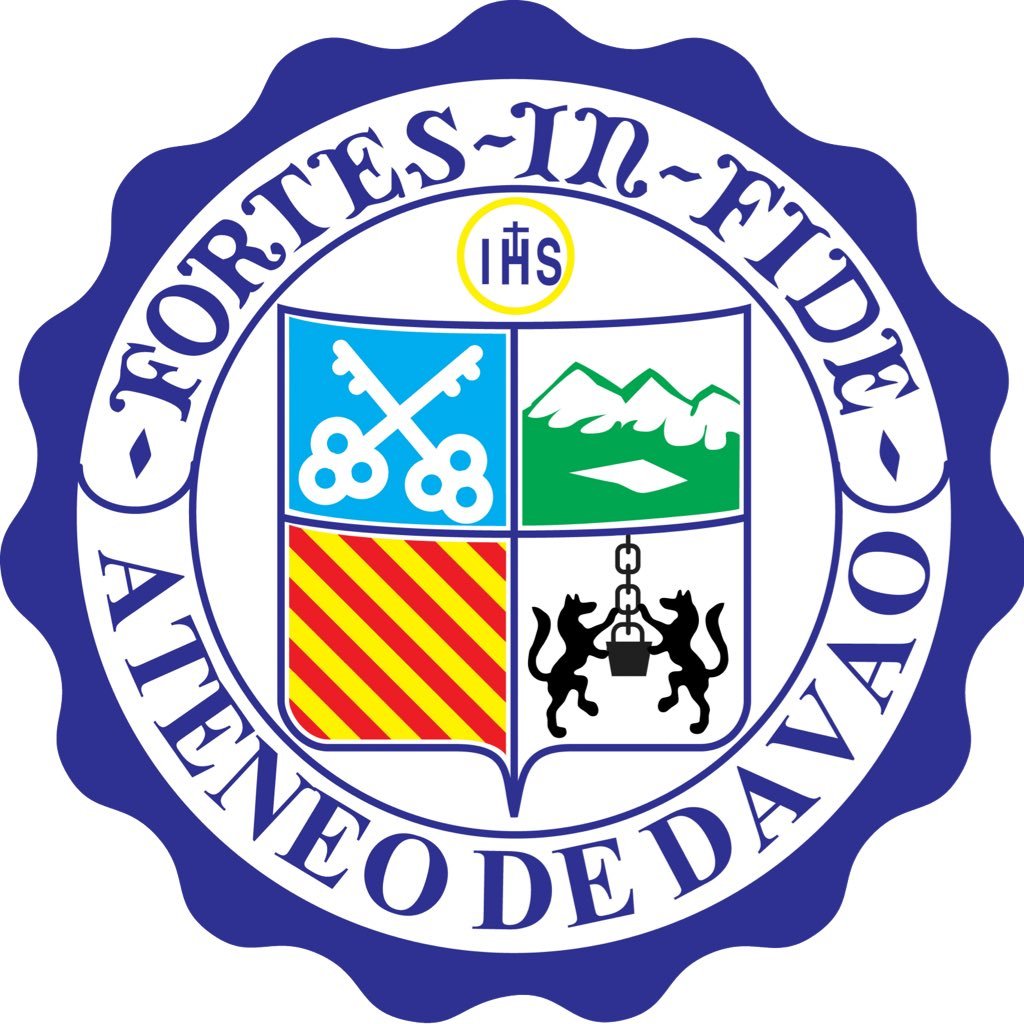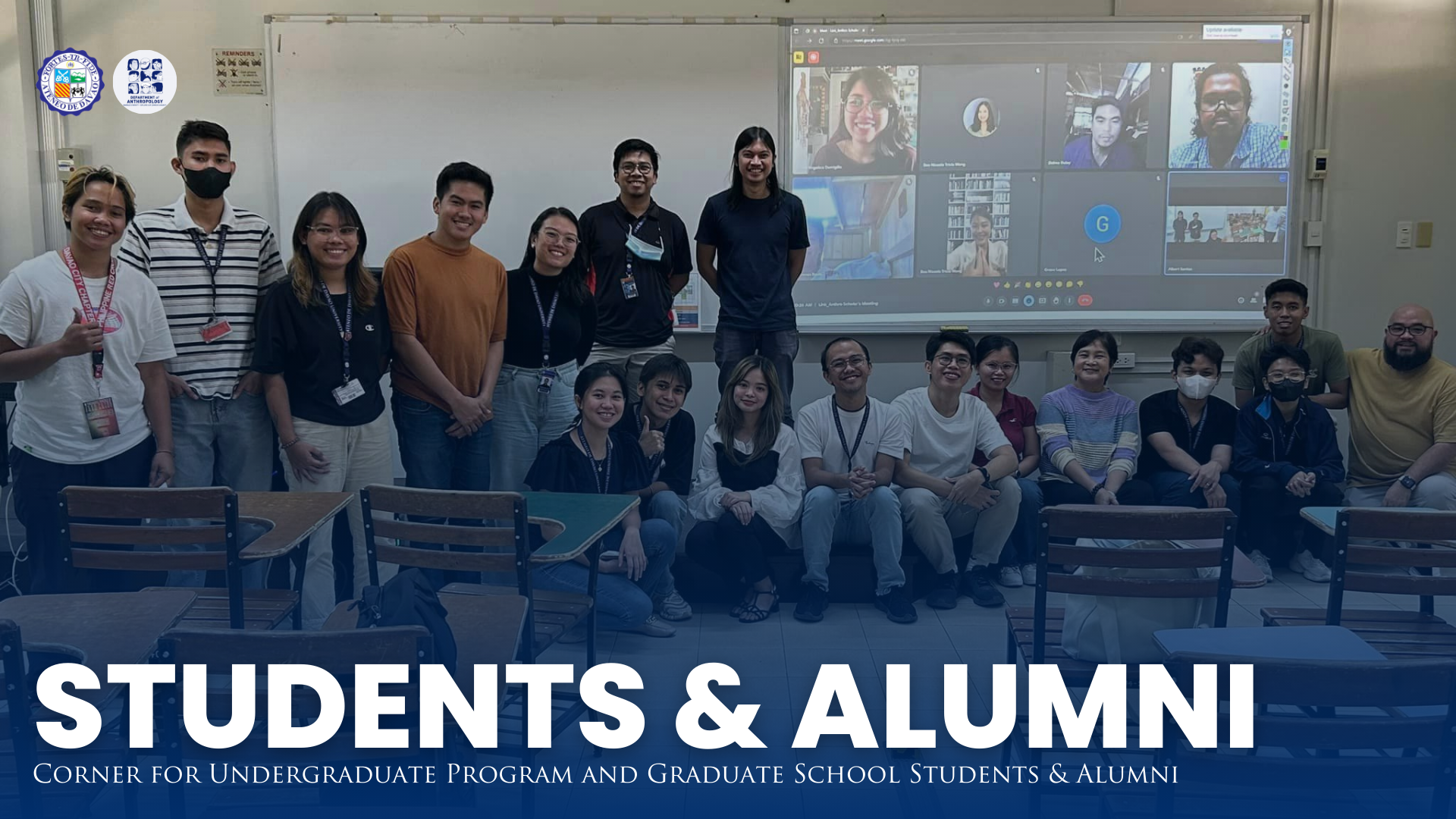
STUDENT ACTIVITIES AND ACHIEVEMENTS FOR A.Y. 2023-2024
The Anthropology Department nurtures the students’ public service capabilities, develops homegrown talents, and provides them with lifelong learning opportunities. It also elevates the quality of education by highlighting sustainability and relevance through research initiatives and educational formation.
Hone your skills, extend your limits, and hold the line with Anthropology now!
AY 2023-2024, Hall of Fame
Dimasuhid clinches fifth in SADSAD 2024
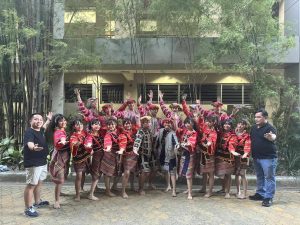
APRIL 18, 2024—In a juxtaposition of graceful yet sharp movements, one finds a dance that illustrates the community’s fight for rights, representation, and freedom. Elliot Dimasuhid, a first-year BA Anthropology student, took the stage as he finished 5th place at the Festival of Excellence’s SADSAD: Mindanawon Cultural Performance.
Paculaba lauds 2nd best speaker in 5th Mindanao Novice Cup
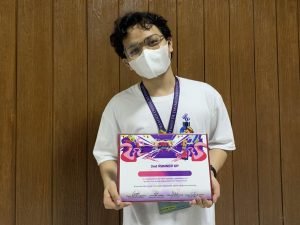 JANUARY 26-28, 2024—Jian Paculaba, a first-year BA Anthropology student, was awarded the 2nd Best Speaker at the 5th Mindanao Novice Cup hosted by the MSU Gensan Debate Society.
JANUARY 26-28, 2024—Jian Paculaba, a first-year BA Anthropology student, was awarded the 2nd Best Speaker at the 5th Mindanao Novice Cup hosted by the MSU Gensan Debate Society.
Lapuz unravels relevance of datuship in Mindanao at DAnthro
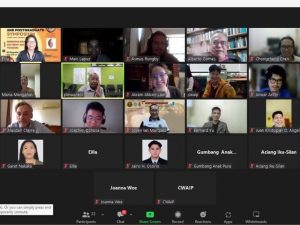 DECEMBER 1, 2023—Maic Lapuz, a fourth-year BA Anthropology student, presented his research titled “The Datu, the Paramilitary, and the Local Government: Indigenous Leadership in the Shadow of the State” during the 2nd Postgraduate Symposium on Indigenous Issues in Southeast Asia Across the Board organized by CWAIP National Tsing Hua University Taiwan, Department of Anthropology – UP Diliman, and Institute of Borneo Studies – Universiti Malaysia Sarawak.
DECEMBER 1, 2023—Maic Lapuz, a fourth-year BA Anthropology student, presented his research titled “The Datu, the Paramilitary, and the Local Government: Indigenous Leadership in the Shadow of the State” during the 2nd Postgraduate Symposium on Indigenous Issues in Southeast Asia Across the Board organized by CWAIP National Tsing Hua University Taiwan, Department of Anthropology – UP Diliman, and Institute of Borneo Studies – Universiti Malaysia Sarawak.
Solante nabs spotlight in 45th UGAT int'l conference
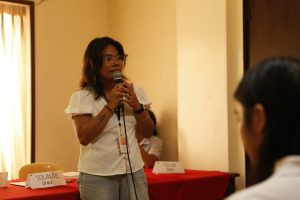 NOVEMBER 9-11, 2023—Grace Edith Solante, a fourth-year BA Anthropology student, won 2nd place of E. Arsenio Manuel Best Student Paper Award during the 45th UGAT International Conference. Her study, ‘Discourse and Practices of Urbanization-Development in Rural-Rural Migration,’ explores the intersection of development and migration within a rural migrant community.
NOVEMBER 9-11, 2023—Grace Edith Solante, a fourth-year BA Anthropology student, won 2nd place of E. Arsenio Manuel Best Student Paper Award during the 45th UGAT International Conference. Her study, ‘Discourse and Practices of Urbanization-Development in Rural-Rural Migration,’ explores the intersection of development and migration within a rural migrant community.
AY 2023-2024, 1st Semester
Senior students celebrate research feats, set future goals at UGAT 2023
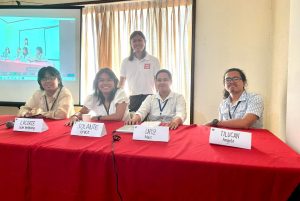 NOVEMBER 9-11, 2023—Four senior students from the BA Anthropology program, namely Angelo Tilucan, Grace Edith Solante, Maic Lapuz, and Sean Anthony Penn Lacorte, presented their research papers during the UGAT 2023 International Conference in Zamboanga City. These research papers mark the culmination of their two-month fieldwork experience in Cabanglasan, Bukidnon where they worked with Umajamnon communities.
NOVEMBER 9-11, 2023—Four senior students from the BA Anthropology program, namely Angelo Tilucan, Grace Edith Solante, Maic Lapuz, and Sean Anthony Penn Lacorte, presented their research papers during the UGAT 2023 International Conference in Zamboanga City. These research papers mark the culmination of their two-month fieldwork experience in Cabanglasan, Bukidnon where they worked with Umajamnon communities.
Ugnayang Pang-Aghamtao Inc. (UGAT), the national organization of anthropologists in the Philippines, hosted the conference at Ateneo de Zamboanga University (AdZU).
A glimpse of Anthro's Field School in Lake Sebu
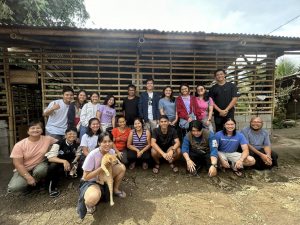
NOVEMBER 16-19, 2023—The first and third-year students from BA Anthropology and third-year students from BSEd-Social Studies of Mindanao Indigenous Peoples (MIP) students carried out their four-day immersion in Barangay T’Kunel, Lake Sebu.
The first-year BA Anthropology – Academic Research students of General Anthropology went to Sitio Laan Bong, Social-Cultural Anthropology and MIP students to Sitio Lemkagang, and Anthropology of Organizations students to Sitio Lemnabol (Sesutunawa); with Albert Santos, Gwyneth Vasquez, and Dr. Rosalinda Tomas as their field supervisors, respectively.
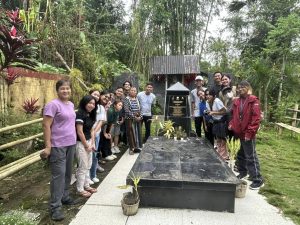
Day 1 of the immersion occurred at Lake Sebu Tourist Assistant Center, T’boli Sbu Senior High School, Santa Cruz Mission School Inc., and Lang Dulay Weaving Center for their cultural trip.
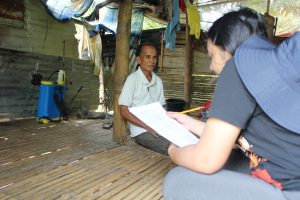
Students started employing their participant observation on days 2 to 3 with their assigned foster families and communities.
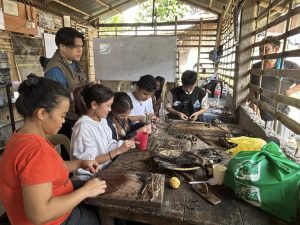
On day 4, students tried their hands at making their own designs on the craft of brass casting with the Sesotunawa community.
Gender equality forum targets issues, SOGIE misconceptions
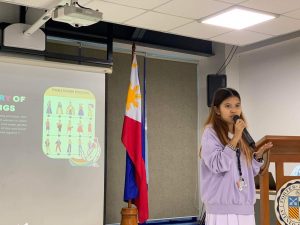 OCTOBER 27, 2023—MASA organized a roundtable discussion titled “Truth & Power: Hisgutanay on Gender Identity and Expression,” delving into the historical transformation of gender identity and expression, providing insights into the evolving trends and challenges confronted by marginalized communities over the years.
OCTOBER 27, 2023—MASA organized a roundtable discussion titled “Truth & Power: Hisgutanay on Gender Identity and Expression,” delving into the historical transformation of gender identity and expression, providing insights into the evolving trends and challenges confronted by marginalized communities over the years.
The event featured Ms. Lyka Mojares, a third-year BA Anthropology student, as the main discussant. Additionally, Mike Joshua Fabie from AB Psychology, Jhoanna Grace Cayanan from Power AdDU, and Archie Barroga from Ateneo Libulan Circle served as reactors.
Anthro brilliance, freshies commended at Sadya 2023
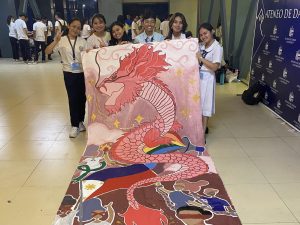 OCTOBER 12-14, 2023—Elliot Dimasuhid and Jian Paculaba, both first-year BA Anthropology students, represented the Social Sciences Cluster at Sadya 2023.
OCTOBER 12-14, 2023—Elliot Dimasuhid and Jian Paculaba, both first-year BA Anthropology students, represented the Social Sciences Cluster at Sadya 2023.
Dimasuhid secured 3rd Runner-Up in the Banner Making Competition, while Paculaba earned 2nd Runner-Up and was recognized as the 2nd Best Speaker in the Ignatian Cup Debate Competition.
MASA houses ML photo exhibit
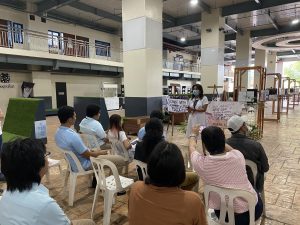 SEPTEMBER 2023—MASA presented “Balik Lantaw: A Photo Exhibit of Davao City in the 1970s” last September 29, 2023. This exhibit showcased a collection of photographs documenting the resistance during the 1970s Martial Law in Davao City, bringing to light the stories, struggles, and triumphs of those who lived through the Marcos dictatorship. The club also posted a statement on the 51st Martial Law Commemoration.
SEPTEMBER 2023—MASA presented “Balik Lantaw: A Photo Exhibit of Davao City in the 1970s” last September 29, 2023. This exhibit showcased a collection of photographs documenting the resistance during the 1970s Martial Law in Davao City, bringing to light the stories, struggles, and triumphs of those who lived through the Marcos dictatorship. The club also posted a statement on the 51st Martial Law Commemoration.
MASA calls for provisions of human rights-based uniform policy to LGBTQIA+ students
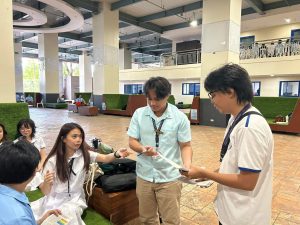 AUGUST 2023—MASA released a joint statement in collaboration with Atenews, JSWAP Ateneo de Davao, Samahan ng mga Mag-aaral ng Agham Pampulitika ng Ateneo – Samapula, and Ateneo Libulan Circle. This collective statement, posted last August 16, 2023, addresses AdDU’s School Uniform Policy for LGBTQIA+ Students. The position taken by these organizations is an act of solidarity with LGBTQIA+ students, challenging the school uniform policy imposed by the Office of Student Affairs (OSA). This policy is criticized for infringing upon the right of LGBTQIA+ students to freely express their gender identities and expressions.
AUGUST 2023—MASA released a joint statement in collaboration with Atenews, JSWAP Ateneo de Davao, Samahan ng mga Mag-aaral ng Agham Pampulitika ng Ateneo – Samapula, and Ateneo Libulan Circle. This collective statement, posted last August 16, 2023, addresses AdDU’s School Uniform Policy for LGBTQIA+ Students. The position taken by these organizations is an act of solidarity with LGBTQIA+ students, challenging the school uniform policy imposed by the Office of Student Affairs (OSA). This policy is criticized for infringing upon the right of LGBTQIA+ students to freely express their gender identities and expressions.
AY 2023-2024, 2nd Semester
Fieldschool in Matina Aplaya
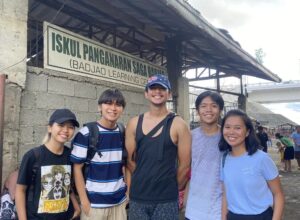
After two months of immersive research, they’ve gained invaluable insights into the daily lives and cultural practices of the Sama-Bajau.
From boatmaking to clothing, religious practices, and beyond, their experience has enriched their understanding of these unique lifeways.
As they transition to thesis writing, they will now consolidate their collected data and insights from this enriching experience.
Occupied Spaces: AnthroFair 2024
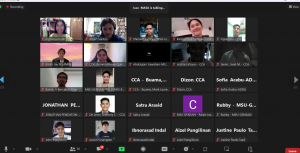
APRIL 26-27, 2024—Eminent scholars from different universities in the Philippines convene in AnthroFair 2024: 3rd National Student Research Conference to uncover new perspectives, challenge conceptions, and advance to a larger discussion about the critical role that spaces play in (re)shaping human and even non-human worlds.
MIP Field School in Miarayon,Bukidnon
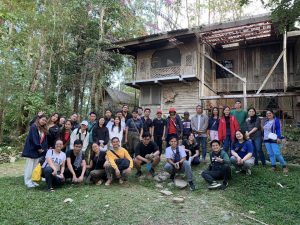
APRIL 11-14, 2024—This four-day immersive experience is an integral co-curricular activity of Mindanao Indigenous Peoples (MIP), an undergraduate elective offered by the Department of Anthropology.
27 students taking up GE 4120 under Prof. Gwen Vasquez gained the opportunity to learn about indigenous peoples from indigenous peoples themselves. The Field School also bridged and grounded students’ theoretical studies by offering actual, on-site experiences of encountering and living among indigenous communities.
Laying the groundwork: Archaeology Training 101
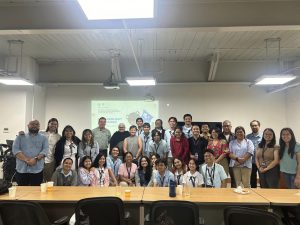 APRIL 5-6, 2024—Day 1 of the training took place at Ateneo de Davao University, providing a fascinating introduction to Archaeology for our Anthropology undergraduate and graduate students and faculty. The session, led by guest speakers Dr. Riczar Fuentes, Dr. Alfred Pawlik, and Dr. Tanya Uldin from Ateneo de Manila University, delved into various archaeological concepts and methodologies useful in analyzing early human settlements.
APRIL 5-6, 2024—Day 1 of the training took place at Ateneo de Davao University, providing a fascinating introduction to Archaeology for our Anthropology undergraduate and graduate students and faculty. The session, led by guest speakers Dr. Riczar Fuentes, Dr. Alfred Pawlik, and Dr. Tanya Uldin from Ateneo de Manila University, delved into various archaeological concepts and methodologies useful in analyzing early human settlements.
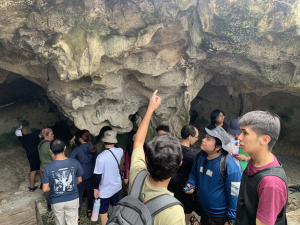
MASA preps for its 3rd nat'l student research conference
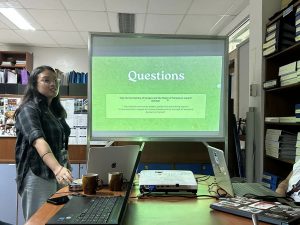 FEBRUARY 2024—MASA is preparing for AnthroFair 2024 which is scheduled to launch this April 2024. AnthroFair is a cornerstone annual event of MASA that aims to showcase the original research of undergraduate students who are currently doing their research, writing proposals, or have done case studies in the field of anthropology and all concentrations in the field of social sciences.
FEBRUARY 2024—MASA is preparing for AnthroFair 2024 which is scheduled to launch this April 2024. AnthroFair is a cornerstone annual event of MASA that aims to showcase the original research of undergraduate students who are currently doing their research, writing proposals, or have done case studies in the field of anthropology and all concentrations in the field of social sciences.
From one researcher to the next: AnthroFair Research Seminar 2024
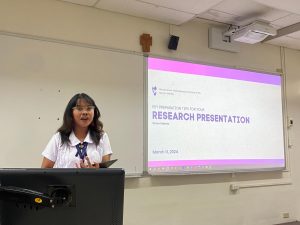 MARCH 11, 2024—From refining oral presentation skills to mastering the art of argumentation, AnthroFair 2024 participants delved into invaluable techniques for translating written research into compelling speeches. This seminar provides undergraduate students with an opportunity to apply both theory and practice in the pursuit of accessible and quality research.
MARCH 11, 2024—From refining oral presentation skills to mastering the art of argumentation, AnthroFair 2024 participants delved into invaluable techniques for translating written research into compelling speeches. This seminar provides undergraduate students with an opportunity to apply both theory and practice in the pursuit of accessible and quality research.
UNDERGRADUATE STUDENTS
1ST YEARS
3RD YEARS
4TH YEARS
Yubryll Grace Ares
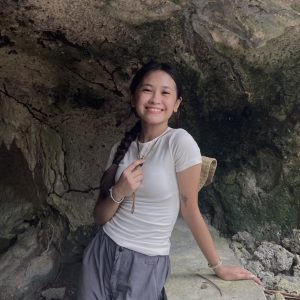
Yubryll has a passion for adventure. Her adventurous spirit is driven by a profound appreciation for the richness of human diversity and a curiosity to understand the world firsthand.
Interests: Cultural Anthropology, Archaeology, Linguistics, Ethnomusicology, Visual Anthropology
Affiliations:
- 1-13A BA Anthro – Acad Res Class Vice President (2023-2024)
- MASA Member (2023-2024)
- Ateneo Film Circle Member (2023-2024)
Elliot Dimasuhid
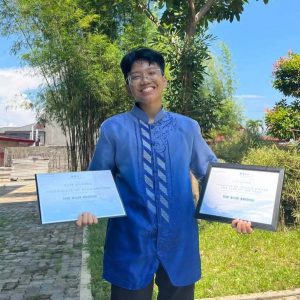
Elliot is a multimedia artist, creative writer, journalist, and activist. He loves crafting narratives with impact—whether it’s about queer youth or sociopolitical issues.
Interests: Cultural Anthropology, Underwater Archaeology, Maritime Anthropology, Linguistics
Affiliations:
- 1-13A BA Anthro – Acad Res Class President (2023-2024)
- Atenews Junior Layout & Graphics Artist (2023-2024)
- MASA 1st Year Representative (2023-2024)
- Social Sciences Committee of Academic Leaders – Asst. Social Media Manager of Academic Affairs (2023-2024)
- The Dragon Post of Social Sciences Student Executive Council – Opinion Writer (2023-2024)
- Society of Ateneo Literature and English Mavens Technical & Productions Committee Member (2023-2024)
- Ateneo Libulan Circle Member (2023-2024)
- Davao Today Contributor (2021-2024)
Jian Paculaba
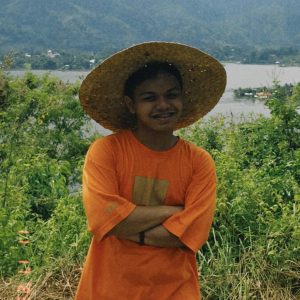 Jii loves to do the things he loves. He follows his heart always.
Jii loves to do the things he loves. He follows his heart always.
Interest: Medical Anthropology
Affiliations:
- 1-13A BA Anthro – Acad Res Class Treasurer (2023-2024)
- MASA Member (2023-2024)
- PIGLAS 37th Representative (2023-2024)
- Council of Class Presidents – Publications & Communications Head of the Office of Secretary-General (2023-2024)
Kiesha Mae Odtojan
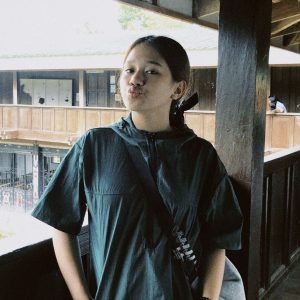
Kiesha loves to explore and wander. Studying anthropology allowed her not only to understand other people’s cultures and lifestyles but also to understand hers.
Interests: Cultural Anthropology, Psychological Anthropology, Evolution, Archaeology
Affiliations:
- 1-13A BA Anthro – Acad Res Class Secretary (2023-2024)
- MASA Member (2023-2024)
Avery Rosete
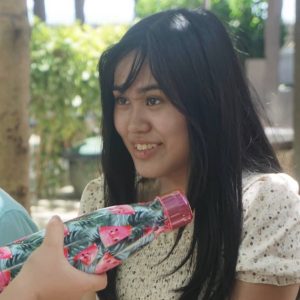 Avery loves studying, reading, writing, photographing, and singing. She is most likely found studying in the AIA office or is off somewhere doing god-knows-what.
Avery loves studying, reading, writing, photographing, and singing. She is most likely found studying in the AIA office or is off somewhere doing god-knows-what.
Interests: Sociocultural Anthropology, Medical Anthropology, Anthropology of Intimacy, Anthropology of Violence
Affiliation: MASA Member (2023-2024)
Lean John Tolero
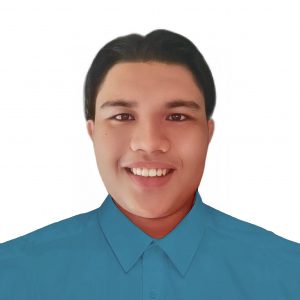 Lean is interested in life during the Proterozoic era up until the Cenozoic era. He wants to find lost treasures and find meaning in how they were made, what they were made for, and who created them. He also loves dinosaurs.
Lean is interested in life during the Proterozoic era up until the Cenozoic era. He wants to find lost treasures and find meaning in how they were made, what they were made for, and who created them. He also loves dinosaurs.
Interests: Physical Anthropology, Archaeology, Zoology, Paleontology
Affiliation: MASA Member (2023-2024)
Khalil Baganian
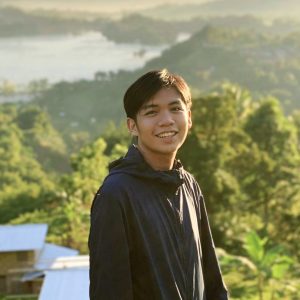
Khalil has a keen interest in urban spaces and the built environment. He enjoys taking photos of architecture, cats, and anything else that catches his eye on his walks home from school.
Interests: State, Security, and Space
Affiliations:
- 3D BA Anthro-Pre-Law Class President (2023-2024)
- MASA Secretary-General (2023-2024)
- National Service Reserve Corps (NSRC) -AdDU Reservist I (2023-2024)
- SAMAHAN Research and Development Member (2023-2024)
- Amnesty International PH Communications Team Member (2023-2024)]
- MASA Member (2021-2023)
Glyza Marie Icao
 Glyza values alone time. Despite appearing intimidating, she’s an approachable senior among her batch—just be careful not to call her ‘ate.’ Ed Sheeran is whom she considers the most influential person in her life, reflecting her interest in various music genres. She also embodies a creative imagination for arts and crafts, aligning with her thesis interest in Badjau clothing.
Glyza values alone time. Despite appearing intimidating, she’s an approachable senior among her batch—just be careful not to call her ‘ate.’ Ed Sheeran is whom she considers the most influential person in her life, reflecting her interest in various music genres. She also embodies a creative imagination for arts and crafts, aligning with her thesis interest in Badjau clothing.
Interests: Anthropology of Development, Economic Anthropology, Business, Cultures, and Society, Anthropology of Dress
Affiliation:
- 3B BA Anthro-Community Development Class President (2023-2024)
- MASA Finance Officer (2023-2024)
- MASA Member (2021-2023)
Fhayed Kulayan
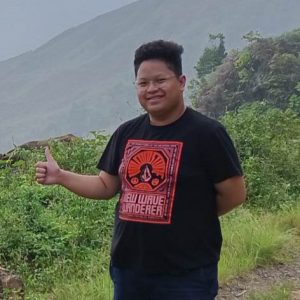
Fhayed, or Finley as he is known to his friends, enjoys playing video games and reading when he ought to be studying, as well as listening to music on his MP3 player, which often strikes people as unnecessary in the age of smartphones and music streaming. He hopes to be able to study and bring to light the wealth of culture of his Sama-Tausug heritage to the rest of the Philippines, and the world, as he believes that Moro culture is a hidden treasure that ought to be beholden.
Interests: Anthropology of Diaspora, Anthropology of Ethnic Identity, Anthropology of Tausug Culture
Affiliations:
- MASA Publications Officer (2023-2024)
- MASA Member (2021-2023)
Lyka Michelle Mojares
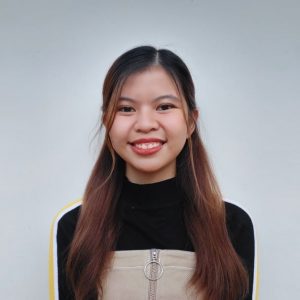
Lyka has a love for board games and card games, as well as participating in insightful conversations. She has an interest in mythology and ancient history. She is currently tackling religious conversion in indigenous communities and the impact it has on their existing cultural practices.
Interests: Metaphysics, Gender and Sex Studies, Anthropology of Religion, Anthropology of Conversion
Affiliations:
- MASA Internal Vice President (2023-2024)
- MASA Member (2021-2023)
Luis Enrico Pasilan
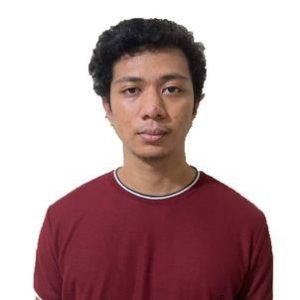
Luis strives to better himself mentally, financially, and especially physically. He has an interest in various online media, palaeontological and archaeological topics, and strength sports. If he ever chooses to pursue a master’s degree in Anthropology in the far future, God willing he would like to be a pioneer in the field of Anthropology regarding Strength sports and its history.
Interests: Anthropology of Community Development, Anthropology of Business and Organizations, Anthropology of Street Vending, History and Anthropology of Strength Sports
Affiliations:
- MASA 3rd Year Representative (2023-2024)
- MASA Member (2021-2023)
Aaron Sinangote
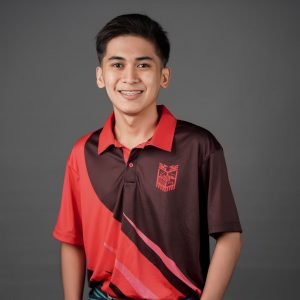
Aaron is the most enthusiastic and dynamic anthropology student ever. He epitomizes the spirit of anthropology, embodying its core values of curiosity, empathy, and respect for diversity. Outside of academic life, he enjoys playing FPS games, basketball, and table tennis. He also likes to go hiking, swimming, sleeping, and listening to music.
Interests: Anthropology of Law and the State
Affiliations:
- MASA President (2023-2024)
- Social Sciences Student Executive Council Anthropology Representative (2023-2024)
- National Service Reserve Corps (NSRC) -AdDU Reservist I (2023-2024)
- Sibol Santa Cruz Member (2023-2024)
- MASA 2nd Year Representative (2022-2023)
- MASA Member (2021-2022)
Edward Dean Mark Abalo
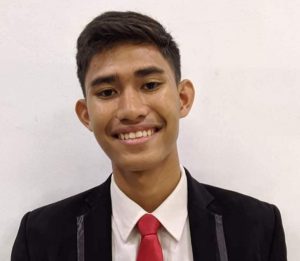
Edward is interested in sports, board games, and thought-provoking discussions. He is also interested in investigating the underlying relationships, dynamics, and implications of religious conversion in indigenous communities.
Interests: Anthropology of Religion, Medical Anthropology, Anthropology of Development, Environmental/Ecological Anthropology
Affiliations:
- MASA 4th Year Representative (2023-2024)
- MASA Vice President (2022-2023)
- MASA Member (2021-2023)
Jannah Maarij Aquilam
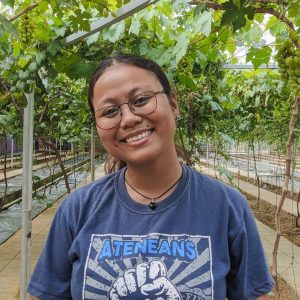
Jannah harbors a passion for dancing and participates in various sports. Her curiosity is drawn toward understanding the underlying vulnerabilities associated with education, prompting her to explore this intersection further.
Interests: Anthropology of Entrepreneurship, Business Culture and Society, Anthropology of Organizations
Affiliations:
- MASA Member (2022-2024)
- MASA Publications Officer (2021-2022)
Eireel Krystel Garillos
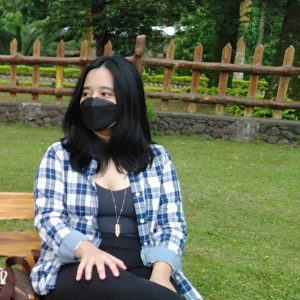
Interests:
Affiliation: MASA Member (2021-2024)
Maic Lapuz
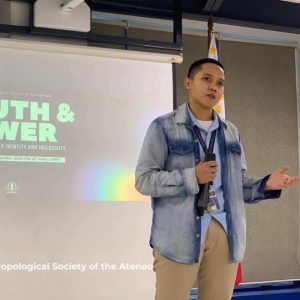
Maic just wants to be a nobody.
Interests: Anthropology of Violence, Local Politics, and Political Organizations, Lumad Datuship in Mindanao
Affiliations:
- National Service Reserve Corps (NSRC) -AdDU Reservist I (2023-2024)
- MASA Secretary-General (2022-2023)
- MASA Member (2021-2024)
Sean Anthony Penn Lacorte
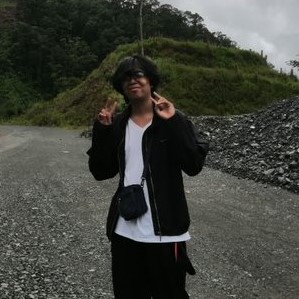
Sean is an artist and an activist. He is mainly interested in critiquing Western modernization and development in its hegemonies in the hopes of creating a better and fairer world through his works.
Interests: Roads & Infrastructure, Modernity, Anthropology of Development, Economic Anthropology, Marxism
Affiliations:
- MASA Member (2023-2024)
- Atenews Head Cartoonist (2023-2024)
- Karatula Davao (2024)
- MASA Creatives Head (2022-2023)
- Atenews Art Editor for Cartoon (2021-2022)
Grace Ana Edith Solante
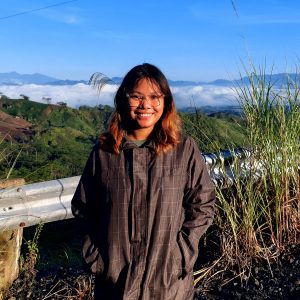
Grace enjoys having intellectual discussions over a glass of red wine or a quality local craft beer. People say she’s a person of opinions, a trait that perhaps aligns with her role as an activist. While she may have a serious demeanor, she values a healthy work-life balance, maintaining her academic pursuits (aka thesis writing) with a fulfilling social life.
Interests: Anthropology of Development, Rural-to-Rural Migration, Post-Structuralist Theories, Militant Anthropology, Indigenous Studies
Affiliations:
- MASA External Vice President (2023-2024)
- MASA President (2022-2023)
- MASA Secretary-General (2021-2022)
Angelo Tilucan
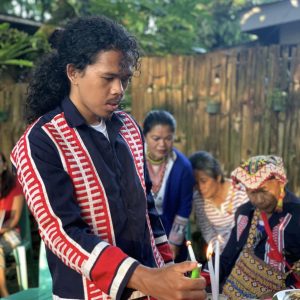
Interests:
Affiliation: MASA Member (2021-2024)
GRADUATE SCHOOL STUDENTS
Amiel Lopez
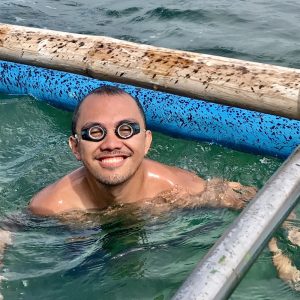
Amiel Lopez is passionate about fostering inclusive environmental initiatives and social justice through anthropology, education, research, and development work. He is the Chairperson of DYESABEL Philippines, Inc., a non-profit organization he co-founded in 2018 to empower Bajau and youth communities in Mindanao.
He is also a part-time college faculty at Ateneo de Davao University, where he teaches the National Service Training Program and the Seniors’ Integration Program to first-year and graduate students, respectively. He is a licensed professional teacher with a BS in Education, majoring in Biological Science, from the same university where he received the Jesuit Mission Award in 2020. He is an MA in Anthropology candidate with a full research grant from the Association for Asian Studies, Inc., supported by the Swedish government. He studied Environmental Issues and Natural Resource Management at East-West Center, University of Hawai’i, as a YSEALI Academic Fellow in 2019. He has also worked as a module developer, consultant, student handbook writer, and program officer in basic education for various local, national, and international institutions and organizations. He was recognized as an Everyday Dabawenyo Hero in 2019 for his contribution to Davao City’s development.
Karlo Jose Alfaro
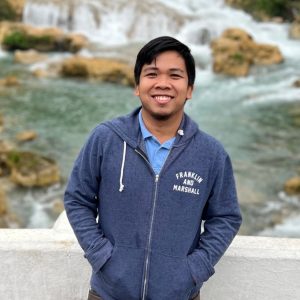
Karlo is a Community Development Officer III at the Department of Social Welfare and Development Field Office XI under the KALAHI-CIDSS Program.
GRADUATE SCHOOL ALUMNI
Raymond Montero-Ambray
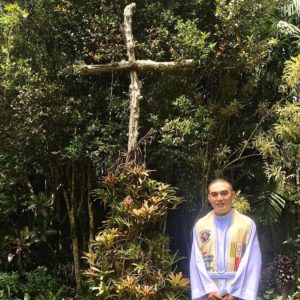
Fr. Raymond is a Catholic priest from the Diocese of Tandag, Director of the Integral Ecology Ministry, Director of the Church History and Heritage Commission, and In-Charge of the LGBTQ+ Apostolate. He is a pastor of a quasi-parish and a member of the Bishop’s Board of Consultors. He has particular advocacies for defending IP rights and their struggle for self-determination. He is an active organizer of ecumenical and non-sectarian groups as environmental defenders. He is an advocate for a just and lasting peace. Apart from the ministries, he enjoys traveling, trekking, mountaineering, and scuba diving.
Albert Santos
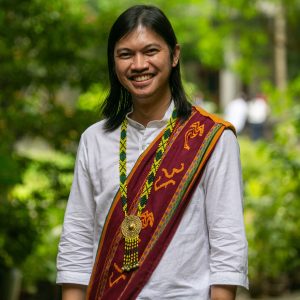
Albert Santos is a cultural anthropologist who completed his BA in Anthropology at the University of the Philippines Mindanao (2013) and his MA in Anthropology at the Ateneo de Davao University (2019). His research interests include the politico-economic and ecological dimensions of agrarian change, the social implications of agricultural biotechnology, and the transformation of indigenous peoples’ knowledge systems and practices. He has been a member of the Department of Anthropology at the Ateneo de Davao University since 2019.
Marites Gonzalo
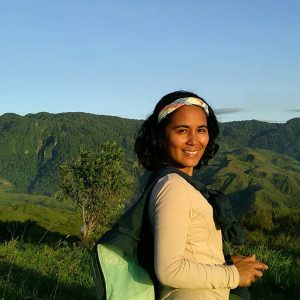
Marites or “Matet” is a Tagakolu anthropologist from Malita, Davao Occidental, Philippines. She is a board member of the Mindanao Peacebuilding Institute Foundation, Inc. (MPI). She is also the Coordinator of the two community-based Indigenous Peoples’ schools of the Malita Tagakaulo Mission (MATAMIS) and in charge of the Ubun na Kettal, the Tagakolu youth program of MATAMIS. She holds a BA degree in Elementary Education from Cor Jesu College in Digos, Davao del Sur, Philippines, and earned an MA degree in Anthropology from the Ateneo de Davao University.
Richard Dian Vilar
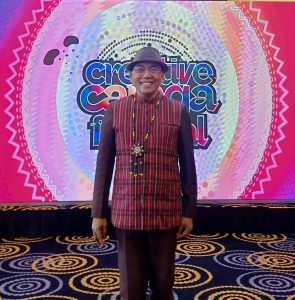
Richard is the best-known international storyteller from the Philippines. He is a theatre director, playwright, actor, choreographer, set and costume designer and has worked with the Kaliwat Theater Collective, Inc. as its Artistic Director and with the Museo Dabawenyo (Museum) as its Curator and Cultural Promotions and External Relations Head. At present, he is the Culture, Heritage, and Arts Officer of the city of Butuan.
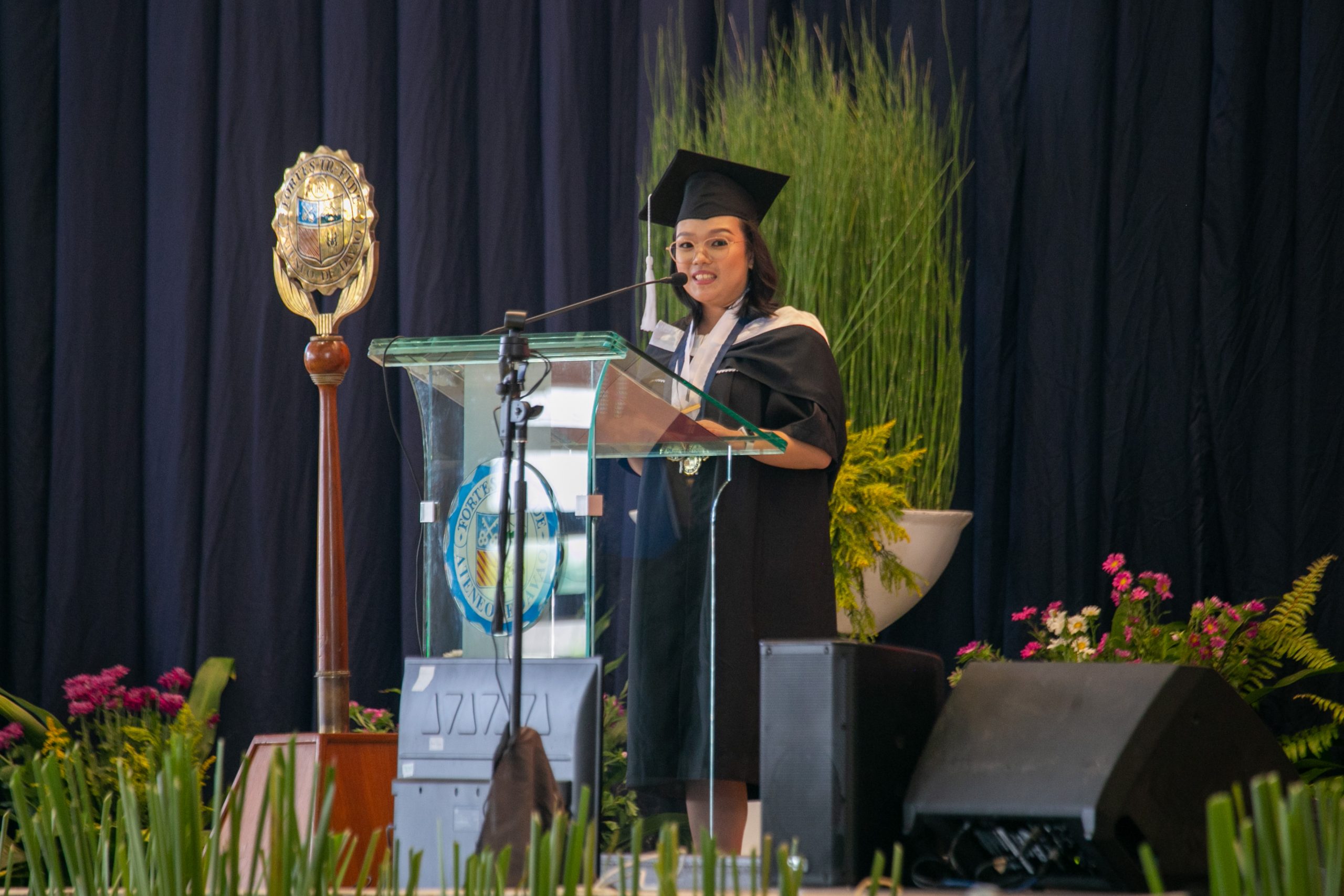
TRANSCRIPT: AdDU 2023 summa cum laude shares the ‘discomforts of privilege’ in viral valedictory speech
Originally Published By PhilSTAR L!FE
Privilege comes with responsibilities. It’s a fact that society needs to be reminded of constantly. It is also the core message of Gwyneth Marie Vasquez’s recent valedictory speech that many people took to heart, lauded, and spread online in recent weeks.
Vasquez graduated summa cum laude of the Ateneo de Davao University Class of 2023 on May 6, 2023.
In a chat with PhilSTAR L!fe, the anthropology major said she finished college with a total grade point average (GPA) of 3.98—only 0.02 points short of the highest grade of the Ateneo system.
The 23-year-old student-achiever shared that it was only in her third year in college that she shifted to anthropology, inspired by her experiences in her elective called “Mindanao Indigenous Peoples.”
“I found myself falling in love with the way anthropologists think and analyze why people do what they do. Most of all, I liked going to the field and meeting different kinds of people,” she said. “Anthropology has a way of getting you in touch with people’s lived realities in a way that other disciplines may not, and I admire that very much.”
Vasquez shed more light on this in her valedictory speech which was shared by Ateneo de Davao Anthropology Department on TikTok last May 18 and has so far earned 2.3 million views.
“Honestly I did not expect it to go viral on social media. So it was quite overwhelming for me to become so visible all of a sudden,” Vasquez remarked. More than anything, the summa cum laude is happy that “people found it moving and relatable enough” that some of them offered to help finance the college education of Weweng, her friend from the Tagakolu tribe she talked about in her speech.
Read the full transcript of Vasquez’s speech below.
To our University President, Rev. Fr. Joel E. Tabora of the Society of Jesus, Chairman of the Board of Trustees, Mr. Benjie Lizada, our Commencement speaker Sr. Maria Marissa R. Viri of the Religious of the Virgin Mary, Fr. Antonio M. Basilio, SJ, Rector of the Davao Jesuit Community, University Awardees, Dr. Gina L. Montalan, Academic Vice President, Members of the Jesuit Community in Davao, Members of the Board of Trustees, distinguished guests, university administrators, faculty and staff, my fellow graduates from the Class of 2023, parents and loved ones, friends who are attending remotely or in-person, ladies and gentlemen, good morning.
When news about the student awardees first came out last week, I received a Facebook message from one of my closest Tagakolu friends, Weweng, a graduating Grade 12 student from Demoloc Valley National High School in Malita. The Tagakolu are an indigenous people who reside in the hinterlands of Malita, Davao Occidental and I lived with them for two months when I did my anthropological fieldwork for my thesis. Anyway, Weweng congratulated me and said: “Super maka inspire kaayu ka, Te. Unta puhon ma parehas ku nimu bahalag di ma valedictorian basta ma pareha lang ku nimo maka human.”
(“You’re super inspiring, Ate. I hope I will become like you soon. I don’t even need to be a valedictorian, as long as I’ll be able to finish college.”)
Out of all the well-wishes that I received, replying to Weweng’s message was the most difficult. I eventually settled with telling her, “Nothing is impossible, Weng! Paningkamot lang og focus lang gyud sa imong gusto maabot. Naa rako diri naga suporta sa imo.”
(“Nothing is impossible, Weng! Just work hard and focus on what you want to achieve. I’m just here to support you.”)
It was difficult because I suspected that there was something untrue about what I said. I caught myself reflecting on the advice I reluctantly gave her and I realized, I had said something problematic.
“Paningkamot” in academia, tends to favor people like me, as with most Ateneans, who have the privilege and the luxury to study without needing to worry about other things. Most of my friends and relatives, having heard about the news of my receiving these awards, would have probably thought that I did it again, that I made it out of sheer will, hard work, and intellect. But, in reality, I have been able to excel because my parents worked tirelessly to ensure that I had all the comforts necessary to focus on my academics. I had the luxury of being a full-time student and of living in a comfortable dormitory as I studied away from home.
Despite having to deal with making ends meet, my parents never made me feel that I had to worry about helping them pay the bills. In contrast, Weweng does not enjoy the same privileges.
She hails from a historically marginalized Tagakolu community that continues to be neglected by the state, and deprived of services that it is supposed to offer its citizens. Her parents have not had any form of mainstream education, and during the time of my fieldwork, they were wage laborers in a land their ancestors used to own and till. I fondly remember strolling through Sitio Matamis with Weweng and the other Tagakolu girls. In a “remote” community with poor infrastructure and intermittent access even to electricity, our main pastime, aside from browsing the internet, was either river-watching or visiting our neighbors. Weweng would then take her leave earlier than most of us because she needed to cook dinner for her parents and siblings. Sometimes she would also help her parents labor in the corn fields. Imagine her now attending to all these responsibilities while being a senior high school student and a volunteer catechist at the Malita Tagakolu Mission.
Despite our different contexts, Weweng and I are, in many ways, similar. We were both born and raised with all the expectations that come with being the eldest daughter of the family; we are both active in our academics and extracurriculars; and admittedly, we both share the same ambition and eagerness to go places someday. There is comfort in discovering our similarities and yet, something bothers me. I know that, similar as we are, we live very different lives and may end up with contrasting futures.
While I certainly do not doubt her intellectual abilities, I recognize that Weweng will have to hurdle more structural barriers in order to achieve her dreams—surely, more than what we, as Ateneo graduates, would need to overcome. This could be what she was alluding to when she told me, “bahalag ‘di ma valedictorian basta ma pareha lang ku nimo maka human.”
In the Tagakolu community where I did fieldwork, just finishing high school was already a huge feat. After high school, many girls of Weweng’s age feel resigned to their fate; succumbing to their disadvantage, giving up on their professional ambitions, and choosing instead a domestic life as wives or mothers. Living among the Tagakolu helped me understand why such choices can make sense within their communities. But for people like Weweng who aspire to go to college, earning a degree, let alone graduating with distinction in a prestigious university is, as the Tagakolu would say, “malug kapetan,” which roughly means “mahirap abutin.”
So what is my point here? One of my most important takeaways as a student of anthropology is reflecting on one’s positionality. The social, economic, and cultural factors that influence how we view the world and how we are viewed by others constitute our positionality. In other words, the way we interact with others, the opportunities that arise, and the challenges we face, are all greatly conditioned by our backgrounds.
Someone like me who hails from a middle-class settler family in Butuan City might be able to enjoy more advantages in the mainstream world than someone of Lumad ancestry like Weweng who grew up in the peripheries with little to no access to social services.
This realization is what made me uncomfortable with advising Weweng about success as simply a matter of “pagpaningkamot” (hard work). I knew very well that what went unrecognized in my own “pagpaningkamot” was the structural privilege that rewarded my own hard work with success.
Weweng and many others like her do not lack “pagpaningkamot.” I have seen that they are just as hardworking as any of us here has been or will ever be. The problem is not Weweng not yet working hard enough or Weweng not too focused enough on her goals. Rather, the problem lies in a society and its institutions that continue to exclude and oppress, that makes it even more difficult for someone of Lumad ancestry to overcome barriers and succeed like the rest of us.
What does this have to do with us, my fellow graduates? We have spent our years in Ateneo de Davao acquiring a strange vocabulary, with phrases like “social justice” and the “common good.” We have been encouraged, in not-so-subtle ways by the Jesuits and their accomplices, to be in the service of others, especially of those who have less in life. We have been challenged to walk the talk. In other words, we are being asked to consider how the privilege of an Ateneo education can be a force for good in this world.
But here is a critical point of reflection as we stand on the verge of this life-defining moment: How would we know what to do with this Atenean privilege if we are not aware of how it shapes how we see the world and how others see us?
I suggest that we begin by taking a long, honest look at ourselves and asking the uncomfortable question about how we have come to acquire our privilege and how others are deprived of it. My fellow graduates, let this privilege be a nagging source of discomfort for its mere existence is an unfortunate reminder that social injustice prevails.
Coming to terms with the advantages that we did not earn requires intense self-scrutiny, but it also entails a readiness to empathize and learn from the experiences of those who come from the fringes of mainstream society. Furthermore, it demands that we actively challenge and dismantle inhumane systems that disrespect and devalue the humanity of those who are different from us.
In the concrete, this means, first, using our privilege to amplify the voices and experiences of those who are underprivileged, a task which can no doubt be done by the brilliant researchers, writers, and online content producers of our batch; second, supporting policies and initiatives that promote equity, an aspect our social scientists can look into, and lastly; creating and recreating scientific and business innovations that are inclusive, culturally-sensitive, and grounded in lived realities, a challenge which I leave to my fellow graduates in the fields of business, science, and engineering.
We can do so much with the privilege we hold. But let’s discard the idea that we simply must translate our privilege into action. To turn this privilege for the benefit of the oppressed, we have to be disturbed by the fact that it exists in society. It should become so unsettling that we will move towards promoting solutions that are bottom-up, and not top-down; it should become so discomfiting that we will place those at the margins at the center of our efforts, instead of using them as a means to achieve our own ends; it should become so upsetting that we will strive for interventions that are grounded in lived realities, and not imagined ones.
I told Weweng that I would always be there to support her in achieving her dreams. It’s a big promise, I know. But perhaps I said it out of guilt— here I am reaping all these accolades from my anthropological work while Weweng’s life and many of my Tagakolu friends’ remain unchanged. It seems clear to me that there is much work to be done to systematically eradicate this inequality.
My fellow graduates, that begins with reflecting upon and being disturbed by the privilege we possess. Only by living with this discomfort can we genuinely and humanely work towards a world where everyone could flourish.
Mao kini ang dapat nato nga paningkamotan. (This is what we must work hard for.)
Thank you and congratulations, everyone.
